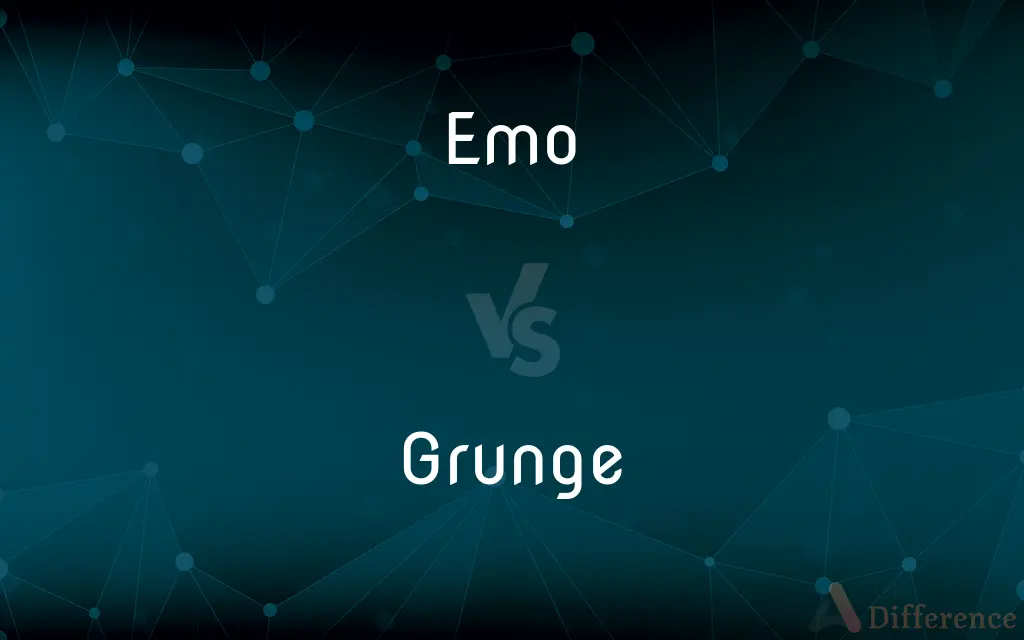Emo vs. Grunge — What's the Difference?
By Tayyaba Rehman & Maham Liaqat — Updated on March 13, 2024
Emo is a music genre and subculture rooted in emotional expression and hardcore punk, whereas Grunge combines elements of punk rock and heavy metal, characterized by its rebellious attitude and distorted guitar sounds.

Difference Between Emo and Grunge
Table of Contents
ADVERTISEMENT
Key Differences
Emo, short for "emotional hardcore," emerged in the 1980s as an offshoot of the hardcore punk scene in Washington, D.C., focusing on the expression of personal and emotional experiences. On the other hand, Grunge originated in the mid-1980s in Seattle, Washington, blending punk's raw energy with heavy metal's distorted guitars and reflecting themes of angst and apathy.
Lyrically, Emo songs are introspective, often exploring themes of love, heartbreak, and personal struggle, aiming to connect deeply with listeners on an emotional level. Whereas Grunge lyrics tend to embody disillusionment and social alienation, with a more generalized critique of society and its norms.
In terms of fashion, the Emo subculture is associated with skinny jeans, tight t-shirts, studded belts, and distinctive hairstyles featuring long bangs. Grunge fashion, conversely, is characterized by its "thrift-store" aesthetic, including flannel shirts, ripped jeans, and unkempt hair, reflecting a nonchalant attitude towards appearance.
Musically, Emo is defined by its melodic musicianship, incorporating dynamic contrasts between soft and loud passages, intricate guitar work, and expressive vocal styles. Grunge music is known for its heavy use of guitar distortion, feedback, and a raw, powerful sound that prioritizes intensity and authenticity over technical complexity.
The fan bases of both genres share a deep connection with the music, often finding solace and identity within the lyrics and ethos. However, Emo fans are particularly noted for forming close-knit communities around shared feelings of emotional vulnerability, while Grunge fans unite in a collective sense of disenchantment with societal norms and commercialism.
ADVERTISEMENT
Comparison Chart
Origins
1980s, Washington, D.C.
Mid-1980s, Seattle, Washington
Musical Roots
Hardcore punk, indie rock
Punk rock, heavy metal
Lyrics
Personal, emotional struggles
Disillusionment, social alienation
Fashion
Skinny jeans, tight t-shirts, studded belts
Flannel shirts, ripped jeans, unkempt hair
Musical Characteristics
Melodic, dynamic contrast between soft/loud
Guitar distortion, raw sound, feedback
Compare with Definitions
Emo
A music genre and cultural movement focused on emotional expression.
Emo bands often use introspective lyrics to connect with their audience.
Grunge
A music genre combining punk's rawness with heavy metal's power.
Grunge bands like Nirvana brought the Seattle sound to international fame.
Emo
Distinctive style involving skinny jeans and tight t-shirts.
Emo fashion is notable for its combination of punk and indie influences.
Grunge
Known for its distorted guitars, raw vocals, and themes of alienation.
Grunge music's gritty sound is a hallmark of its rebellion against polished rock.
Emo
A community that values deep emotional connections and expressive authenticity.
The emo subculture fosters a space for discussing personal and emotional issues.
Grunge
Its influence remains in music, fashion, and the ethos of disillusionment.
Grunge's legacy is evident in the enduring popularity of its bands and aesthetic.
Emo
Characterized by its emphasis on emotional lyrics and melodic instrumentation.
Emo music blends punk's intensity with indie rock's melodic complexity.
Grunge
A style marked by flannel shirts, ripped jeans, and a careless attitude.
Grunge fashion reflects a rejection of mainstream consumer culture.
Emo
Impact on fashion, music, and youth culture focusing on emotional expression.
Emo influence can be seen in the widespread adoption of its fashion and musical styles.
Grunge
Emerged as a counter-culture reacting against the era's mainstream music.
The grunge movement was synonymous with Seattle's early '90s music scene.
Emo
Emo is a rock music genre characterized by an emphasis on emotional expression, sometimes through confessional lyrics. It emerged as a style of post-hardcore from the mid-1980s hardcore punk movement in Washington, D.C., where it was known as emotional hardcore or emocore and pioneered by bands such as Rites of Spring and Embrace.
Grunge
Grunge (sometimes referred to as the Seattle sound) is an alternative rock genre and subculture that emerged during the mid-1980s in the American Pacific Northwest state of Washington, particularly in Seattle and nearby towns. Grunge fuses elements of punk rock and heavy metal, but without punk's structure and speed.
Emo
Rock music characterized by confessional lyrics about emotional topics.
Grunge
(Informal) Filth; dirt.
Emo
A particular style of hardcore punk rock
Grunge
Rock music that incorporates elements of punk rock and heavy metal, often expressing a bleak or nihilistic outlook.
Emo
An individual of people associated with that subculture and musical style.
Grunge
(informal) Dirt or filth, especially when difficult to clean.
The cinema floor was covered in grunge deposited by the crowds.
Emo
Any form of guitar-driven alternative rock that is particularly or notably emotional
Grunge
(informal) The state of being filthy; grubbiness.
Chad used to work as a coal miner, but couldn't handle the constant grunge.
Emo
An individual of people associated with a fashion or stereotype of that style of rock.
Grunge
(music genre) A subgenre of alternative rock, originating from Seattle, Washington, which melds punk and metal.
Alice liked to wear plaids and ripped jeans, and listen to grunge.
Emo
A young person who is considered to be over-emotional or stereotypically emo.
Grunge
The state of being covered with unclean things
Emo
Emotional; sensitive.
Emo
Depressed.
Emo
Associated with youth subcultures embodying emotional sensitivity.
Common Curiosities
What is the main difference between Emo and Grunge music?
The main difference lies in their emotional focus and musical style; Emo is more about personal emotion and melodic expression, while Grunge focuses on social disillusionment with a raw, heavier sound.
Can Emo and Grunge be considered purely musical genres?
While both started as music genres, they grew into cultural movements encompassing fashion, values, and a sense of community.
How do Emo and Grunge fashion differ?
Emo fashion is more about tight-fitting, punk-inspired clothes with expressive accessories, while Grunge fashion is characterized by a laid-back, thrift-store aesthetic.
Why did Grunge become so popular in the 1990s?
Grunge's popularity stemmed from its authentic, raw sound and its reflection of youth disillusionment, offering an alternative to the polished, overproduced music of the time.
Are there any common misconceptions about Emo and Grunge?
Yes, Emo is often mistakenly associated solely with sadness or depression, and Grunge is sometimes misunderstood as merely a fashion statement rather than a music genre with depth.
What impact did the internet have on the Emo subculture?
The internet played a significant role in spreading Emo culture, allowing for the creation of online communities where fans could share music, fashion, and emotional support.
How did Emo evolve from its origins?
Emo evolved from hardcore punk, incorporating indie rock influences to create a more introspective and emotionally nuanced sound.
What role do lyrics play in Emo and Grunge music?
Lyrics are central to both; Emo lyrics delve into personal and emotional struggles, while Grunge lyrics express disillusionment and societal critique.
How do Emo and Grunge address themes of authenticity?
Both genres emphasize authenticity; Emo through personal emotional expression and Grunge through raw, unpolished music and rejection of mainstream values.
How did the respective subcultures of Emo and Grunge influence broader youth culture?
Both subcultures influenced broader youth culture by challenging mainstream norms, promoting authenticity, and fostering communities around shared feelings and experiences.
Why is Grunge often associated with the Seattle music scene?
Grunge is associated with Seattle because the city was the birthplace of the genre and home to many of its seminal bands in the late '80s and early '90s.
Share Your Discovery

Previous Comparison
Flyer vs. Banner
Next Comparison
Analytical vs. TechnicalAuthor Spotlight
Written by
Tayyaba RehmanTayyaba Rehman is a distinguished writer, currently serving as a primary contributor to askdifference.com. As a researcher in semantics and etymology, Tayyaba's passion for the complexity of languages and their distinctions has found a perfect home on the platform. Tayyaba delves into the intricacies of language, distinguishing between commonly confused words and phrases, thereby providing clarity for readers worldwide.
Co-written by
Maham Liaqat













































